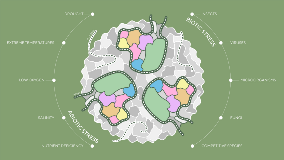Mechanism of Condensate Formation

Condensates are membrane-less cellular foci that are formed to carry out specialized function. There are different classes of condensates, depending on their localization, composition and complexity of their function. Some of them are present continuously; others are induced for example by abiotic/biotic stress. In our group, we are particularly interested in abiotic stress-induced condensates called Stress Granules (SGs). SGs are formed transiently within first few minutes of stress, and as soon as stress ace, they dissolve. Even though there is a lot of knowledge existing in mammalian and yeast cells, still not much is known about SGs dynamic and function in plants.
We are interested in uncovering the mechanism of SGs (and other condensates) formation in response to high temperature, salinity and low oxygen stress. Focusing on few SGs proteins such Rbp47b, Ubp1, ECTs and others, we aim to identify signal that leads to formation/disassembly of SGs. It is well accepted that liquid-liquid phase separation (LLPS) might be an initial trigger for that process, however SGs are very heterogeneous and contain more than hundred proteins, dozens of metabolites and also many hundreds of mRNAs. By studying composition of SGs under different stresses, protein properties and post-translational/post-transcriptional modifications we aim to get closer to discovering the signal for SGs assembly/disassembly but also to understanding the mechanism of sequestration of different components.